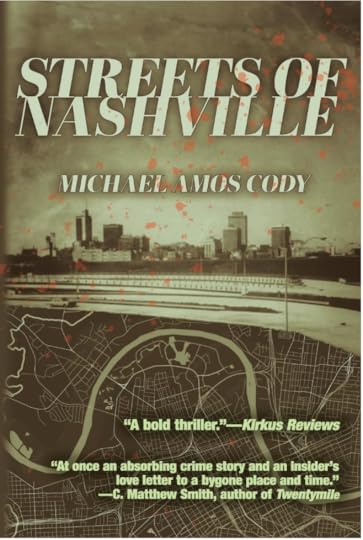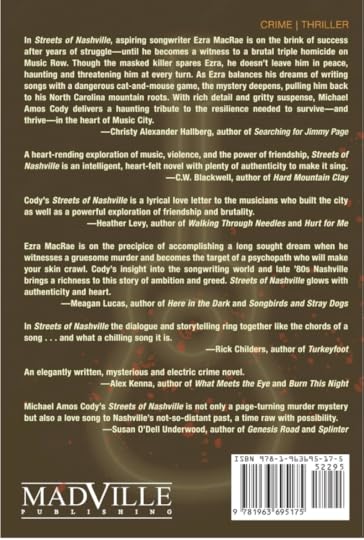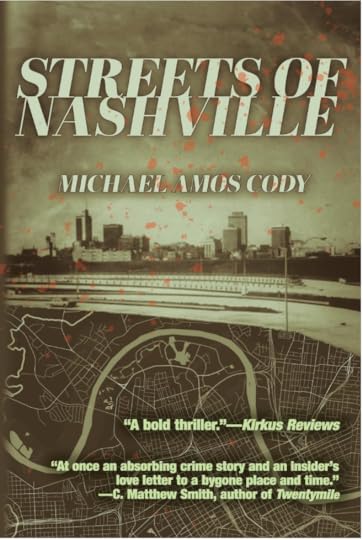Michael Amos Cody's Blog
September 19, 2025
The One-Star Rating

Without an accompanying review, does it say more about the rater or the rated?
My latest novel Streets of Nashville has been out for five months (since its release on 15 April 2025). Sometime last week, a one-star rating appeared on Amazon. Given that reviews have been good and ratings prior to last week have ranged from five stars to three, with five stars prominent, I expected the inevitable one-star rating to incite a little feeling of devastation.
But it didn’t. I had a quick thought of Well, damn, but that was it. Had the rating been accompanied by a review explaining why the rater disliked it to that extreme, I would’ve paid more attention (and probably would’ve felt more of that expected devastation), but the idea popped into my mind that without a review to explain the rating, the one star seems to me to say more about the rater than it does about the writer or the book.
Sometime before this, A Twilight Reel received a one-star rating/review on Goodreads. I was actually interested in what the review had to say about the book. Although it made some interesting claims, it remained too vague. If, as the review said, I never met a cliché I didn’t like, then I would’ve benefited from a couple of examples. The rating/review stayed up just a day or two and then disappeared. I don’t know what’s up with that.
August 10, 2025
On Ezra MacRae and Mel MacOde . . . and Hugo Rodgers
A few people have asked me about the exact nature of the relationship between Ezra and Mel in Streets of Nashville. At least one has followed that question with this one: “Are they gay?”
I understand why some readers might ask. Ezra and Mel end their phone calls with “Love you, Ez” and “Love you, too” or vice versa. Main character Ezra thinks of Mel often and, once the danger of Hugo Rodgers breaks into his life, often longs to be home—and safe—with Mel in Runion. In addition to these examples, they’re comfortable expressing their love for each other physically. Early in the novel, after an evening of hanging out at the Runion Pizzeria, they take leave of each other this way:
“Interesting,” Mel said again through another yawn and a shiver.
Ezra grinned, knowing Mel was done for the evening. “Bring it in,” he said.
As was their ritual when parting, they cupped the back of each other’s neck with their left hands and touched foreheads together. Then Mel lifted Ezra in a bear hug.
“Love you, Chief,” Ezra grunted. “Love you, too, Ez.” Mel set him down, and they stepped apart. “Drive safe tomorrow and watch your back in the big city.”
Given the past half century (at least) of life in the United States of America, questioning the sexuality of these characters is understandable. But are they gay? No, they’re not. Their bond might be understood in the context of male friendship or homosociality. They’ve been raised—and have, in a sense, raised themselves—without the cultural taboos against expressions of love in friendship (the Greek philia). As for the physicality evident in their relationship, the novel alludes a few times to the boys-will-be-boys activity of wrestling that can be fairly common from childhood into young adulthood. The suggestion in the novel is that this wrestling has been a significant part of their fun growing up and has allowed them to be unashamedly physical in the expression of their feelings for each other.
Ezra and Mel grew up in the 1960s and ’70s, and Streets of Nashville takes place in 1989, as they’re entering their thirties. Not surprisingly, I grew up in the same time period but not with the freedom they feel. I never saw my dad embrace another man—not even my brother or me, as I recall. (That might have changed if we’d had more time with him; he died in 1996, at the age of 65.) These days, I freely hug my sons, male cousins, brother, and many of my male friends—hug them hello and hug them goodbye.
Society and culture don’t necessarily make it easy for men like Ezra and Mel to have a deep, rich, expressive friendship. In John Mellencamp’s song “Check It Out,” the second verse reads:
(Check it out)
Going to work on Monday
(Check it out)
Got yourself a family
(Check it out)
All utility bills have been paid
You can’t tell your best buddy that you love him
Three out of the four lines—not counting the “Check it out” interjections—are characteristic behaviors expected of a “man” in the US: heading a “traditional” family, going to work, paying the bills. But to “tell your best buddy that you love him”? This isn’t broadly accepted masculine behavior. It remains eyebrow-raising if not outright frowned upon.
As I suggested above, this has been the case for at least fifty years. Those who’ve directly asked me about the relationship between Ezra and Mel have heard me tell the following story in my attempt to make these characters understandable. Back around 1975, I was sitting in my high school civics class as a discussion or lecture was taking place. I no longer remember the context, but I remember the much-loved-and-feared instructor J.D. Wallin saying something like this (and I paraphrase):
I feel sorry for you young men in the class because you can’t express your love for you best friends. When I was your age, I could go to Mars Hill with my best friend on a Saturday. We could go see a movie together and have popcorn for a dime. We could walk down the street afterward with our arms around each other’s shoulders, and nobody thought a thing about it. You young men can’t do that anymore.
That’s among the few things I remember from high school, and it came to mind time and again as I created Ezra and Mel and the relationship between them. I wanted them to be more like Mr. Wallin and his friend than like the homophobes of the last half century and more who would deny my characters these outlets of expression.
I think of the characters’ parents as well. Ezra’s father is a Presbyterian minister, and his mother is vivacious and outgoing—a minister’s wife who plays anything but second fiddle to her minister husband. Such a household, in which Ezra is an only child, stands somewhat apart from the stereotypical family structure implied in Mellencamp’s lyric.
While readers know just a bit about Ezra’s family, they know almost nothing about Mel’s. But, as author, I know. Mel’s mother is a native of Amsterdam, capital of The Netherlands. His father met her there in the years after World War II and eventually invited her to the US and married her. They were farmers and raised Mel and his younger brother Curtis into a life dictated more by nature and its rhythms and relationships than by popular culture.
Look for more on Mel MacOde in an upcoming novel tentatively titled A Summer Abroad. I hope to have a draft of it finished by the end of 2026. We’ll see how—and if—it makes its way out into the world from that point.

A few words on Hugo Rodgers: Unlike Ezra and Mel, Hugo, almost a generation older, is gay, but also unlike Ezra and Mel, he grew up internalizing the homophobia of his father and family, his football coaches, his preacher, pretty much his entire southern Mississippi culture of the 1940s and ’50s. Somewhere beneath his internalized homophobia, he loves Lucio and crushes on Ezra. The novel, I hope, gives readers the sense that he would—if he could—give up this self-hatred and be as happy in life and love as anybody can be. But he is unable to let go, and the torment he’s unable to transcend drives him downward to dark places and catastrophic actions.

An AI-generated image of Hugo’s eyes.
August 6, 2025
G. Robert Frazier’s Chapter 16 Review of STREETS OF NASHVILLE
Despite the machinations of the wicked Washingtonians currently in power and slashing vital National Endowment for the Humanities funds, Humanities Tennessee and its literary outlet, Chapter 16, carry on!
G. Robert Frazier, who lives in La Vergne, Tennessee, wrote the following review of Streets of Nashville for Chapter 16.
Learning the Hard Way
The music industry can be murder in Michael Amos Cody’s thriller Streets of Nashville
The music industry can be a cutthroat business when it comes to recording contracts, shady promoters, and new talent desperate to make it big. It can also be murder. Ezra MacRae learns that the hard way in Streets of Nashville, the new crime thriller from poet, novelist, and songwriter Michael Amos Cody.
A dreamer from the small, rural North Carolina town of Runion, MacRae is on the verge of making a name for himself among hundreds of other music hopefuls after six years of pushing his songs in local honky-tonks and publishing houses.
When we meet him in 1989, he’s just landed a two-year, $15,000 per year guaranteed songwriting contract with independent music house Ave Canora, and he’s convinced bigger things are ahead.
“For years he’d been certain that the songwriting life in Music City was his calling,” Cody writes. “But the streets of Nashville hadn’t embraced him as he’d hoped they would, offering only occasional hinted promises to distract from the rejections.”
In a celebratory mood, MacRae spends the night relishing his good fortune at a local lounge. While walking home in the early hours of Easter morning on Music Row, MacRae suddenly finds himself witness to a violent shooting outside his publishing house that leaves three people dead and another injured by a stray bullet.
MacRae himself comes face to face with the shooter, who inexplicably spares his life and races away from the crime scene.
The next few hours under police interrogation at the scene and the next day alone at his humble apartment are a whirlwind of emotions for MacRae. “Why am I alive and sitting here,” he asks himself over and over. “Why am I alive?”
Cody effectively pulls readers into the narrative by taking time to show MacRae’s emotional trauma and never lets up. While later revisiting the crime scene, MacRae has a moving breakdown.
“He stood frozen in fear greater than he remembered feeling at that senseless, violent moment,” Cody writes. “Again, as in his dream on the morning after, everybody in the scene leveled a gun at him, and his vison blurred with a wash of tears.”
The author even goes so far as to get into the head of the killer, identified early on as disgruntled record producer Hugo Rodgers, with several chapters spotlighting the villain and his nefarious intentions.
It’s not long before Rodgers amps up the tension by calling and stalking MacRae about what he’s seen, putting the fledgling songwriter on edge. But as MacRae and the police work to identify the killer and bring him to justice, Rodgers is already on a mission to make things even worse — by threatening MacRae’s family back home in Runion.
A desperate race across state lines to warn his family follows, setting the stage for a final, gripping showdown in the rural hills of North Carolina.
Streets of Nashville unfolds at a quick, emotionally charged pace thanks to Cody’s terse, clean writing style. Occasional song lyrics are interspersed throughout the chapters to further establish the varied moods and faces of Music City, both good and bad.
[links added]


July 25, 2025
Rev. Benjamin Cremer Has the Floor . . .
should be held more accountable by Christians, not less.”
Neither political party represents the whole of the gospel of Jesus.
The gospel of Jesus is not a political platform; it is the inbreaking of God’s reign, a movement marked by self-giving love, justice, mercy, and reconciliation. It cannot be confined to any one nation, ideology, or party. While some political causes may resonate with elements of the gospel (such as care for the poor, defense of the vulnerable, or pursuit of justice), the fullness of Christ’s message transcends and often critiques all earthly systems of power.
Jesus himself refused to be co-opted by the political factions of his time, whether the zealots, the Herodians, or the Pharisees. He disrupted expectations on all sides, calling all people instead into a radical way of love, humility, and truth.
Yet only one political party in our time has been overwhelmingly claiming to represent Christianity for the last 50+ years.
Since the rise of the Religious Right in the 1970s and 80s, a powerful alliance formed between conservative evangelical Christianity and the Republican Party. This was not primarily a grassroots theological movement, but a calculated political strategy, spearheaded by figures like Jerry Falwell, Paul Weyrich, and Pat Robertson, to consolidate Christian voters around issues like segregation, abortion, school prayer, and opposition to LGBTQ rights.
This movement reframed Christianity in the public imagination, especially in the United States, as being synonymous with conservative politics. Over time, this association deepened, with phrases like “Christian values” and “family values” used almost exclusively to describe Republican aligned Christians. Meanwhile, issues like economic justice, racial reconciliation, peacemaking, environmental stewardship, and care for the immigrant, deeply rooted in Scripture, were often ignored or even opposed by the same coalition. Simply because some of these values were advocated by the “other side.”
This identification of faith with a single party has caused immense harm to the church’s witness. It has contributed to the rise of Christian nationalism, diluted the gospel into a tool for partisan gain, and alienated countless people, especially younger generations, from faith altogether.
The crux of this issue is that any party that claims to represent Christian values should be scrutinized more by the church, not less.
When a political party wraps itself in Christian language and symbolism, it does not become more trustworthy, it becomes more dangerous. History shows us that when the church weds itself to political power, it often ends up compromising the very heart of the gospel. From Constantine’s imperial church to the Crusades, from colonial missionary empires to the state churches of Europe, the pattern is tragically familiar: power corrupts and the message of Jesus is distorted and weaponized.
Theologically, Christians are called to be a prophetic people, not a partisan one. We are to speak truth to power, not be seduced by it. As 1 Peter 2:11 reminds us, we are “foreigners and exiles” in this world, not party loyalists. The church must never outsource its moral imagination to any political agenda. Rather, it must hold all earthly power to account in light of Christ’s gospel, a movement where the last are first, the peacemakers are blessed, and the poor are lifted up.
In our time, scrutiny of this “Christian party” is treated as betrayal, but it is actually faithfulness. It is what the prophets did to kings, what Jesus did to religious leaders, and what the early church did under empire. If a party claims to speak for Christ, then the church must be especially vigilant to ask: Which Christ? The crucified Savior of the Gospels, or a Christ of our own making?
The tragic reality is that much of today’s political harm, particularly policies that strip away rights, target marginalized groups, or elevate power over compassion, is being passed under the banner of “Christian values,” with little resistance from the church. This lack of accountability has allowed hypocrisy to flourish. Leaders can champion “family values” while displaying none of Christ’s character, and pass legislation that causes real suffering while receiving applause from pulpits. When the church refuses to hold such actions to account, it not only abandons its prophetic calling, it becomes complicit in the injustice itself.
This is why the church must reclaim its role as a holy outsider, not chaplain to political power, but a witness to a different way. The gospel calls us not to protect Christian power, but to embody Christ’s love, especially for the least, the last, and the lost.
May it be so with us.
 Subscribe to Into The Gray: Substack
Subscribe to Into The Gray: SubstackBy Rev. Benjamin R. Cremer · Launched a year ago
July 14, 2025
July 14, 2025
According to my blogging schedule, every second Monday in the month supposed to be a miscellany of some sort or a miscellaneous post. Today, I’m feeling rather pointless. Not useless but pointless. I gave blood today, so there’s that at least. Afterward, a nap. No writing, little reading, no teaching. (I finished my Summer I grading and turned in final grades for the session yesterday.)
I finally decided to look through some very old blog for July, one of which turned out to be Tuesday, July 14, 2009. That’s, what, sixteen years ago? I was Leesa and I were approaching our 20th wedding anniversary. Lane was about to turn 33 years old, and Raleigh was closing in on 18. I was an Associate Professor at ETSU and Director of the University and Midway Honors Scholars Programs. We had escaped the difficult and embarrassing years of the George W. Bush presidency and were basking in the glow of the new Obama presidency. We were yet seven years from the horrors of Trump’s first presidency, during which we would learn to look back on the Bush years with longing.
Anyway, I guess I was feeling similar 2009 to how I’m feeling today, because that blog post also led me further into the past, to diary entries for 1978 and 1979. On July 14, 1978, I was 19 years old and a music major at Mars Hill College. On July 14, 1979, I was 20 and touring Europe via an AESU student tour.
Here’s the diary entry from 1978 (via my Captain’s Log):

The Walnut Youth Group never recorded an album. I have no memory of Pam Club. The rolling car I stopped and prevented from crashing into something or somebody in the heart of Asheville included one old woman (old to 19-year-old me), who sat in the passenger seat screaming for help.
Here’s the July 14 diary entry from my 1979 summer abroad in Europe:

Skinny dipping Londoners on a boat anchored among the Greek isles.
Forty-six years ago today.
July 3, 2025
“We have met the enemy . . .
. . . in the mirror.”
It’s no secret and should come as no surprise that the majority of current elected leaders from the president and vice president (and their ignorant, unqualified minions) up through the U.S. Congress to many if not most of the state houses and governors are spineless and mindless, having no moral compass and no capacity for shame.
That’s where we are.
That’s who we are.
That these leaders hold the positions they hold and do the damage they do to the ideals of the United States of America is lamentable. It’s infuriating. But it’s not surprising. They’re not the sickness, sick as they are. They are a symptom of what’s wrong with us.
And what’s wrong with us?
Our terminal diagnosis is ignorance.
Over the last century and possibly more, we’ve devalued education to the point where a majority of people can’t think past the prejudices that blind them to what is good. They’re impressed by our fool of a president and our snake of a vice president, and they laugh, drooling, in support of them because these two men hate who they hate. (Truth is, the president and vice president also hate those who fools who voted for them.)
I could provide examples of our terminal ignorance, but I don’t see the point. Those who need to learn either don’t care or won’t get it. But consider one simple example: the pervasive so-called reality shows that gave us our president. They don’t require any thought; they’re nothing but entertainment for those who are entertained by such. And, of course, they’re not even reality. Even if the words are specifically scripted, it’s all scripted. An extreme example is Naked and Afraid. Our lizard brains like it because they’re naked, but that brain can’t or won’t recognize that the rest of it isn’t real. The “contestants” aren’t afraid, aren’t alone. There’s an entire camera crew there, from director down to best boys and grips, whatever those are. And yet we zone out and eat it up.
Many hope we will do better in coming elections. Maybe we will, but I doubt it. Ignorance and lazy minds are not things that can be corrected during an election cycle. And if we don’t take serious steps to try and reverse this condition (and it’s likely we won’t), it’ll be as permanent and destructive as climate change. We are unlikely to vote for better people ever again, unless better people are able to entertain and deceive our uneducated voters as well as the current clowns and third-rate stand-up comics.
To put it simply for all, the simpleminded included: We’re fucked.


What Is AVALON MOON?
Back in the winter, while finalizing and waiting for the 15 April 2025 publication of Streets of Nashville, I finished the first and second drafts of a new novel titled Avalon Moon.
Like my short story collection A Twilight Reel, all of Avalon Moon takes place in the vicinity of my fictional North Carolina mountain town of Runion.
Here’s my elevator pitch:
In AVALON MOON, somebody is killing people—two by two, female and male—in the mountains of western North Carolina, and the local newspaper editor works with a reclusive finder-of-lost-things and two extraordinary young women to discover the killer, unwittingly making themselves potential pairs of targets.
Here’s part of the query letter for the publisher:
AVALON MOON opens in the mountains of western North Carolina on the eve of Winter Storm Ulysses. Before the blizzard begins, a group of local farmers and landowners meet with the county extension agent to discuss concerns that Avalon Orchards—once a thriving, idealistic community established on an island in the French Broad River—is creating a wolf sanctuary. But penned wolves on Avalon’s Christabel Island will soon be the least of the community’s worries.
A local man has gone missing and is soon found dead in a highland meadow, side-by-side with an unknown woman. When a second man—an unsuspecting visitor to the area—goes missing and a female deputy is found dead, Gabriel Tanner, editor of Runion’s weekly newspaper, and Plumer Reeves, a recluse haunted by the disappearance of his wife a few years before, suspect that somebody is hunting in their mountains. Two extraordinary young women, Avalon’s Ariel Anderson and Lonesome Mountain’s Livvy Goforth, join the editor and the recluse to lead the attempt to discover the killer and stop the killings.
Some information you might find interesting:
The year is 2014. I think this is my first time to set a story in the time of cell phones and widespread computer use, so that was different.The newspaper editor, Gabriel Tanner, is one of two first-person narrators in the story. If you read my first novel, Gabriel’s Songbook , then you know Gabriel and his wife Eliza. Gabriel turns fifty-five years old as the story is getting underway.If you read my story “Conversion,” either online at the late great Still: The Journal on in A Twilight Reel, then you’ve met Avalon Moon‘s Livvy Goforth. Livvy is a five-year-old girl in “Conversion.” She’s an intriguing character, I think, who never says a word, but it’s hinted that she has some kind of power that’s part of Appalachian mountain lore. I remember reading for and talking with a book club when A Twilight Reel was just out, and one of the club members asked what happens to Livvy. The question stuck with me, so here she is, now twenty years old and still an intriguing mystery in herself.Plumer Reeves is the “reclusive finder-of-lost-things.” His first name is my father’s and rhymes with rumor, and his last name is my mother’s maiden name.Charles Brockden Brown (1771-1810), a Philadelphia author that I wrote my dissertation and first book about, makes an appearance via a long lost Avalon manuscript.Here’s a picture painted by my late friend Don Neblett (1933-2025) that hangs above my desk at home. I don’t know if it could be the cover, but it was inspiring.

I might also add that a submission of the first fifty pages of Avalon Moon was a 2023 Claymore Award Finalist in the Southern Gothic category. (The Claymore is associated with the Killer Nashville International Writer’s Conference.) The Claymore doesn’t offer Appalachian Gothic as a category, which is more accurately what Avalon Moon is.

June 12, 2025
“Pity the Nation”
This is about the nation—once great, now so very not—that follows its 47th president as a god, lifting his ignorance and meanness and avarice up to replace the one true God the people once pledged to live under.

Back in the late 18th century, Thomas Jefferson predicted this would happen.

We have met Jefferson’s “single zealot” twice now,
and we have new numbers for the beast: 45 & 47.
We might not survive this second encounter.
June 4, 2025
Reading STREETS OF NASHVILLE
I don’t have any idea how many folks out there are reading my new novel Streets of Nashville. While I’m certain that it’s not as high a number as I would like it to be, I’m grateful for everybody who is tackling the story and reaching out to say so via email or texts or social media.
One response that I haven’t expected is how quickly some folks have read it. Here are some words from the reachers out mentioned above:
“I am the slowest reader and I read to page 300 [in a single day, I’m guessing — out of 331 pages]. That says a lot.”“Read it all day yesterday and finished up this morning. FABULOUS! It kept me captivated and i couldn’t put the damn thing down! Great work!”“Get yourself a copy for the weekend, I promise you won’t regret.I read it in one day!” [Facebook post]“Got your book . . . (Streets of Nashville) and couldn’t put it down until I finished it. I enjoyed the story but I also like your writing style. I’m looking forward to the next book.”Not everybody’s an Evelyn Wood speed reader (I know I’m not — and who gets that reference anyway?), and that’s more than okay:
“I’m a thriller/mystery reader and your book has all the right stuff, Michael.”“This is a solid, well-crafted thriller set in Nashville in 1989. Songwriters, murder, revenge, sexuality: it’s got a lot going on, and it does it all well.”“I’ve been making myself read only 2–3 chapters a week. I’m on chapter 49. I raced through Gabriel’s Songbook in a couple of days and then had nothing to look forward to when I was done. This one is a Hitchcock-like mystery…going slow keeps me in suspense. I’m anxious to find out how it ends but I know I’ll be sorry (in a good way) when I learn how everything unfolds. It’s a great read.”Then there’s the reader who sent me this:
I’ve been saving Streets of Nashville for when I finished the other books I was reading and could bring to it a clear mind – so I planned to spend this week in the mountains, including taking my time with the book, but then, oh well, I stayed up all night and read the whole thing.
My oh my what a wonderful novel! There are so many things I loved about it – of course 1980’s Nashville, the gorgeous descriptions of weather and the sky, the mature exploration of whether or not an Appalachian man can go home again, the intelligent and nuanced reintegration of the Self, the grappling with evil and shame and love, and on and on while still being a page turner.
If you’ve read it, I hope you enjoyed it. If you’re reading it, I hope you’re enjoying it. If you have access to Goodreads or Amazon, I hope you’ll consider giving it a rating, maybe even a few words of review.

Thanks for reading!
May 27, 2025
May’s 4th Tuesday (with a Crotchety Old Man)
“Voters knew he believed in nothing, which meant he could conceivably do anything, making him the perfect candidate upon whom to pin their wildest dreams. . . . The problem with running as the candidate of people’s dreams is that, eventually, they wake up.” — Yair Rosenberg
Here’s another political collection of memes of note. . . .

















Okay, one more . . .




